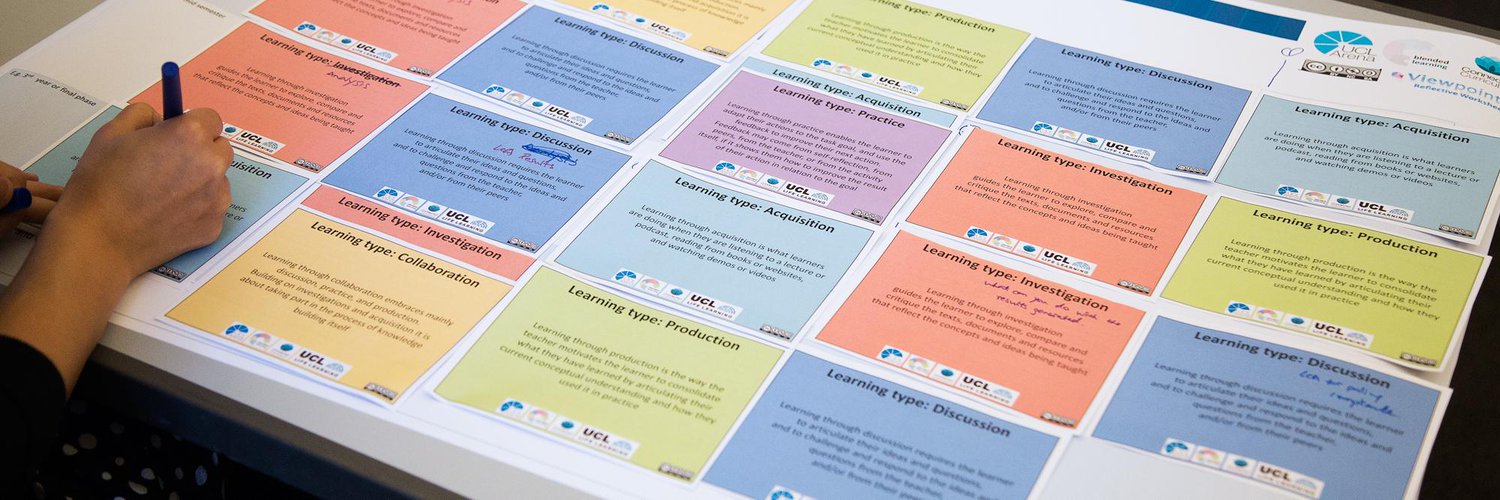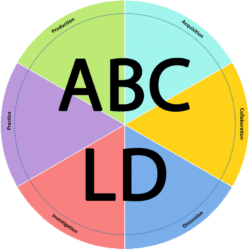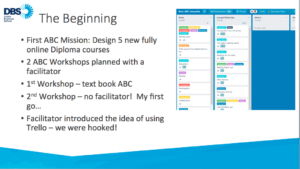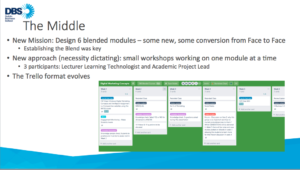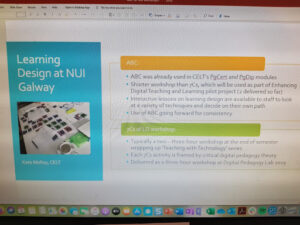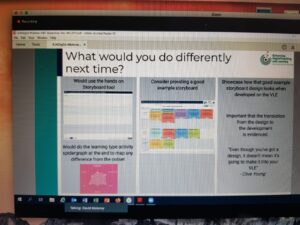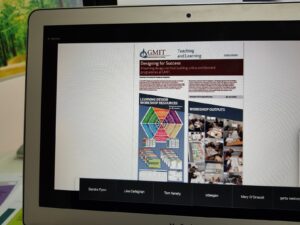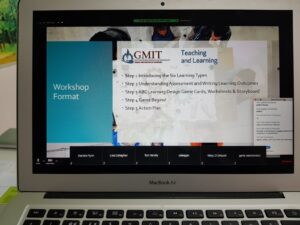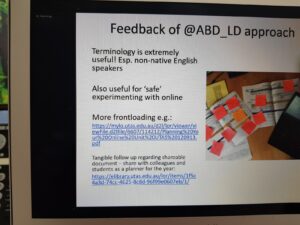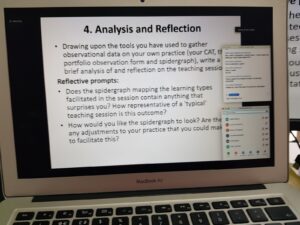In October 2019, Dublin City University (DCU) initiated a special interest group and webinar series called ‘ABC Learning Design Swap Shop’ to promote the sharing of knowledge and experience around implementation of ABC. This community was set up as part of the ABC to VLE project to provide an opportunity for educators across Ireland who are using the ABC learning design method to swap ideas about approaches they have tried in different contexts. Through a webinar format, anyone who is considering or is already using the approach was invited to come along, share their experiences and join in the conversations about ABC Learning Design.
Webinar technology was deliberately chosen to enable maximum inclusion and attendance from participants across the country. This community has already met four times (October 21st, December 4th, January 15th, March 11th) and has brought together participants, mainly academic developers and learning technologists, from 10 higher education institutions across Ireland. It has led to active and interesting discussions, where, for example, attendees identified the need for further training/support for novice ABC facilitators. Digitised adaptations have also been discussed (well before Covid-19!) and practical ideas and challenges have been shared. A brief overview of each Swap Shop is outlined below:
Webinar 1, October 21st
This webinar kicked off short talks by Isabel Ashburner (Dublin Business School) and Clare Gormley (DCU). There were 18 attendees from a range of HE institutions across Ireland including Maynooth University, NUI Galway, University of Limerick, Mary Immaculate College, Hibernia College, Dublin Business School, and of course DCU. It led to an active and interesting discussion, including the following highlights:
- Attendees identified the need for further training/support for ABC facilitators – interesting points were raised about the challenge of facilitating ABC workshops if working alone, including difficulties in timekeeping.
- Discussion about DBS use of Trello as a link from the workshop to the development and delivery phases. Isabel highlighted its use as a ‘living’ planning board which is referred to beyond the ABC workshop at her institution.
- Conversation about the need for participants to come adequately prepared for the ABC workshop (e.g. familiar with learning outcomes) and the challenges of this in practice. Clare highlighted ‘Pre ABC’ learning outcomes-focused discussion activities that were introduced at DCU.
Webinar 2, December 4th
This webinar was delivered in partnership with the Irish Universities Association #IUADigEd project that aims to mainstream digital in teaching and learning activities in Irish universities. Two members of the project team joined this webinar to share their experiences of the method with the assembled group of 16 participants.
Kate Molloy (NUI Galway) explained that the ABC approach has been in use as part of local PGCert and PGDip academic development modules. In terms of her own practice, she explained that when she first applied the approach, she was already very familiar with Conole’s 7Cs of Learning Design approach (2014) and had developed a ‘ready to go’ custom version of that toolkit. What appealed in particular to her about ABC was the rapid fire, tightly-timed format that would not require extensive blocks of time from staff mid semester. In sharing her experiences about using the method to date, she highlighted the following lessons learned from recent use of the approach within the context of the IUA DigEd pilot project:
- Having watched all the preparatory videos and reviewed the materials, sticking rigidly to the format with minimal intervention may have backfired a little in timings.
- For the Tweet exercise especially, participants seemed perhaps overly concerned about wording and word count, possibly because everyone wanted to contribute.
- The teams were unable to complete all aspects of the workshop within 90 minutes (they started but did not complete storyboarding) but participants generally liked the format overall and said they found it useful working through it in course teams.
Kate plans to use ABC as a Learning Design Framework more consistently but “going forward, I would remix the materials to suit our needs, as I did with the 7Cs”.
David Moloney of University of Limerick (UL) talked us through his experience of using elements of the ABC approach with programme teams to design/redesign programmes in human rights and criminal justice. His first goal was to ask participants to “stand in students’ shoes” i.e. to consider what they would like to experience if they were students on the programme in question. In particular, he highlighted the following aspects of the approach:
- The relative simplicity and clarity of the cards which he described as “extremely intuitive”, with examples that help to link the learning types with formats/activities that make sense to participants.
- The potential for digitisation of some elements of the workshop – for example, in his case, Mentimeter was used to pose questions to develop the spider graph element of the process. In a break with ABC tradition, he also discussed that instead of using the standard printed storyboard poster, he used the University of Ottowa’s Course Structuring Tool as an online spreadsheet for each team to develop a storyboard.
- The value of developing a storyboard that acts as a concrete foundation for the design.
- The potential of ABC for identifying where further academic development or digital competency professional development may be required.
Interestingly, David’s workshop also drew from a number of other frameworks (the OULDI Course Features cards, for example) and his group also ran over time in completing the storyboard. It is also worth noting what he might do differently next time, as outlined in the image below:
Webinar 3 January 15th
In this session, Dr Carina Ginty of Galway-Mayo Institute of Technology (GMIT) stepped us through their extensive implementation of the ABC LD approach. Since 2018 ABC workshops have been run across four GMIT campuses for the benefit of programme teams in multiple disciplines including business, IT, hospitality, sports science, furniture design, creative arts and more. By January, 200+ staff had engaged with the method which has also been integrated into their PG Certificate and Diploma in Teaching & Learning. It is also woven into that institution’s processes for programmes moving to blended or online delivery.
Specific adaptations described by Carina included:
- Inclusion of additional supports within an extended workshop format, including guidance and resources on writing learning outcomes and understanding assessment & feedback concepts.
- Inclusion of learning outcomes-oriented game activities to help create correctly worded outcomes, select appropropriate learning activities, and align with assessment ideas.
- Inclusion of Online Course Design Scorecard/Rubric, currently in pilot phase.
Webinar 4 – March 11th
In this session, Dr Briony Supple of University College Cork (UCC) explained how they have been using the ABC approach. The university’s move to the Canvas VLE was a major driver for adoption of ABC as was the embedding of the Connected Curriculum at UCC (comprised of Research Based teaching, Employability, Sustainability, Trans & Interdisciplinarity, Global Reach, and Community Engagement). By the time of the Swap Shop webinar in March, some of their experiences of ABC included:
- Use of the method in a range of international contexts (including Tokyo, thanks to HEA Mobility Grant) and in a partnership with final year students in a BComm International with Hispanic Studies programme.
- Confirmation that the clear terminology of the framework is “extremely useful” especially to non-native English speakers.
- Suggestion that sometimes more frontloading in advance of ABC sessions may be needed. Briony identified the Curriculum Stocktake idea featured in an Online Planning Guide by University of Tasmania (UTAS) as a potentially useful tool to help plan the learning experience and think through some ideas before the workshop itself.
- Use of ABC’s spider graph concept in another context as a reflective prompt when asking teachers to reflect on a teaching session within their own practice – Briony explained how she got staff to map out the learning types of a session on a spider graph and asked them how they might adjust that in future.
Overall, the four events promoted the sharing of approaches from multiple contexts in what we hope was a welcoming and accessible way. A huge thanks again is due to all the speakers who contributed to these sessions. As so many institutions will almost certainly have modified/extended their existing approaches further in response to Covid-19, the value and benefit of continuing to share experiences is clear. If you are interested in participating in a Swap Shop, please join the group. The date of the next Swap Shop session will be announced over the upcoming academic year.
